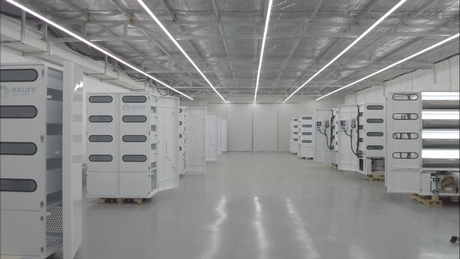Considering how critical it is to clone and root cannabis plants perfectly to ensure the success of the crop as a whole, the selection of the proper cloning methodology is of paramount importance. A way to approach this issue with peace of mind is through aeroponic cultivation. “There’s no medium, and plant roots are sprayed directly with water and nutrient, maximizing the general uptake, and on the other hand, hugely reducing the water consumption,” Gilad Krakower, CEO of Quiclone, explains.
Gilad Krakower, CEO of Quiclone
Aeroponic cloning
But there are also additional benefits to aeroponic cloning. “Clones root much faster,” Gilad remarks. “This would ultimately allow growers to do more cycles over the year, thus eventually increasing the annual yield.” Quiclone has combined aeroponic cloning with automation, developing a machine that allows growers to flawlessly root their cannabis plant in a safe environment so that when they are transplanted, they can grow strong and healthy.

“By relying on an automated aeroponic system, growers can root their plants easily while being sure that these are taken care of in the most precise and meticulous way, thanks to the features of our systems.”
Addressing the growing demand
In order to support a larger number of growers worldwide, Quiclone has completed the construction of a new 7,000 sq. ft. factory. “We ramped up the production of our system to meet the growing demand for automated aeroponic cloning units,” Gilad says. “Additionally, we can also scale-up our R&D capacity to include even more features in our system, as well as developing new products.”

One of these new features, says Gilad, is already in the pipeline. “We are working on a cloud platform to gather all the data allowing growers to create time-based recipes.” Bluntly put, such a feature would allow a grower to carry out even more meticulous and precise cloning, as variables can be set up so they automatically change in specific moments. “Thanks to this new platform, you can set the temperature of the water, the light intensity, and so on at specific times,” he points out. “For instance, initially growers want to keep the light intensity down so as not to stress the clones, and maybe, later on, they want to increase that. Thanks to that cloud platform, you can set the times at which a specific variable changes.”

But this is just the beginning for Quiclone, as a new quality of life features are currently being planned, as well as new, unannounced products. “Now, thanks to our increased workspace and R&D capacity, we are working on new features that will help to make the cloning process even easier. At the same time, we are also developing something new, and we can’t wait to show it to the world.”
For more information:
Quiclone
+86 1888 942 8861
[email protected]
https://quiclone.com
